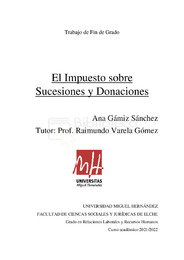Por favor, use este identificador para citar o enlazar este ítem:
https://hdl.handle.net/11000/27903El Impuesto sobre Sucesiones y Donaciones
| Título : El Impuesto sobre Sucesiones y Donaciones |
| Autor : Gámiz Sánchez, Ana |
| Tutor: Varela Gómez, Raimundo |
| Editor : Universidad Miguel Hernández de Elche |
| Departamento: Departamentos de la UMH::Ciencias Sociales y Humanas |
| Fecha de publicación: 2022-06 |
| URI : https://hdl.handle.net/11000/27903 |
| Resumen : He decidido realizar, investigar y estudiar el impuesto sobre Sucesiones y Donaciones para ser el protagonista de mi TFG a nivel estatal y una breve comparativa del ISD en diferentes Comunidades Autónomas del territorio español, tratando de abordar cuestiones como sus deducciones y bonificaciones propias de cada Comunidad. Este impuesto tiene diversas opiniones favorables de mantenerlo y otras, en cambio, de eliminarlo del sistema tributario español, y este trabajo servirá para entender cómo funciona de una forma más específica y llegar a una conclusión personal de si se debe mantener o, al contrario, derogarlo. Por esta razón y como reto personal ya que, aunque mi Grado esté enfocado al mundo laboral, el tema fiscal sobre todo en este impuesto me ha llamado siempre la atención por ser muy criticado en la sociedad. Por ello, para finalizar este trabajo, se expondrá un caso práctico por un causante con residencia habitual en territorio de la Comunidad Valenciana a modo de ejemplo. Su normativa está contenida en la Ley 29/1987, de 18 de diciembre y en el Real Decreto 1629/1991, de 8 de noviembre. A pesar de ello, actualmente, el Impuesto sobre Sucesiones y Donaciones está siendo el centro de un gran debate. Hay quienes piensan que éste debe ser derogado y otros que es importante que el Impuesto de Sucesiones y Donaciones siga vigente. Este impuesto no tributa de igual manera en todo el territorio español ya que, según en qué Comunidad Autónoma se tribute, este impuesto tiene un porcentaje inferior o superior de tributación y puede variar de una forma desorbitada en diferentes Comunidades Autónomas por ello existe esta disputa con el impuesto. Esto ocurre porque el Impuesto sobre Sucesiones y Donaciones fue cedido a las Comunidades Autónomas, a través de la Ley 30/1983, de 28 de diciembre, y se ha ido reproduciendo en las sucesivas leyes de financiación de las CCAA, la última, es la Ley 22/2009, de 18 de diciembre, que regula el sistema de financiación de las Comunidades Autónomas de régimen común y Ciudades con Estatuto de Autonomía y se modifican determinadas normas tributarias (en adelante Ley de financiación CCAA de 2009). Los poderes normativos del impuesto se descentralizaron y las diferentes regiones desarrollaron su propia competencia fiscal entre ellas que ha provocado que su tributación sea tan desigualada para los contribuyentes. The taxes that apply to all citizens help contribute to the country's public spending. Use these resources to support health, education, unemployment benefits or pensions. They are, therefore, the main source of financing for the State's public spending and thus, together, satisfy the common good. Therefore, Spain, in order to carry out these expenses, needs income that is obtained directly from taxes and these must take into account some principles that are regulated in the Spanish Constitution, article 31 "everyone must contribute to the maintenance of expenses according to their economic capacity and through a fair tax system, inspired by the principles of equality and progressiveness that in no case will have a confiscatory scope. The Inheritance and Donations tax is direct, personal and progressive, that is, it will contribute to the maintenance of the public sector based on the assets and profits of which the taxpayer is the owner at the time of accrual. This means that taxpayers, with different payment capacities, will pay taxes differently and depending on their wealth. This tax has been in force in our country since 1987 and, specifically, it is regulated in Law 29/1987 on Inheritance and Donations Tax and in the subsequent Royal Decree 1629/1991 that addresses its Regulations. Throughout its validity, the ISD has undergone numerous reforms at the regional level. For this reason, it is being debated whether the Communities are prepared to assume these regulatory capacities, whether this tax should be abolished, whether it complies with the principles of article 31 of the Spanish Constitution, since this tax, at first glance, does not seem to be very equitable. Depending on the Autonomous Community in which the taxpayer resides, he will be taxed quite differently for the Inheritance and Gift Tax. For this reason, this work has been carried out with the aim of understanding how it works and why this tax is paid differently and if it complies with the principles mentioned above. its fiscal regulations, its structure and its differences between Autonomous Communities will be detailed. |
| Palabras clave/Materias: trabajo impuesto fiscal |
| Área de conocimiento : CDU: Ciencias sociales: Economía: Trabajo. Relaciones laborales. Ocupación. Organización del trabajo |
| Tipo de documento : info:eu-repo/semantics/bachelorThesis |
| Derechos de acceso: info:eu-repo/semantics/openAccess |
| Aparece en las colecciones: TFG - Relaciones Laborales y Recursos Humanos |
 La licencia se describe como: Atribución-NonComercial-NoDerivada 4.0 Internacional.
La licencia se describe como: Atribución-NonComercial-NoDerivada 4.0 Internacional.
.png)
